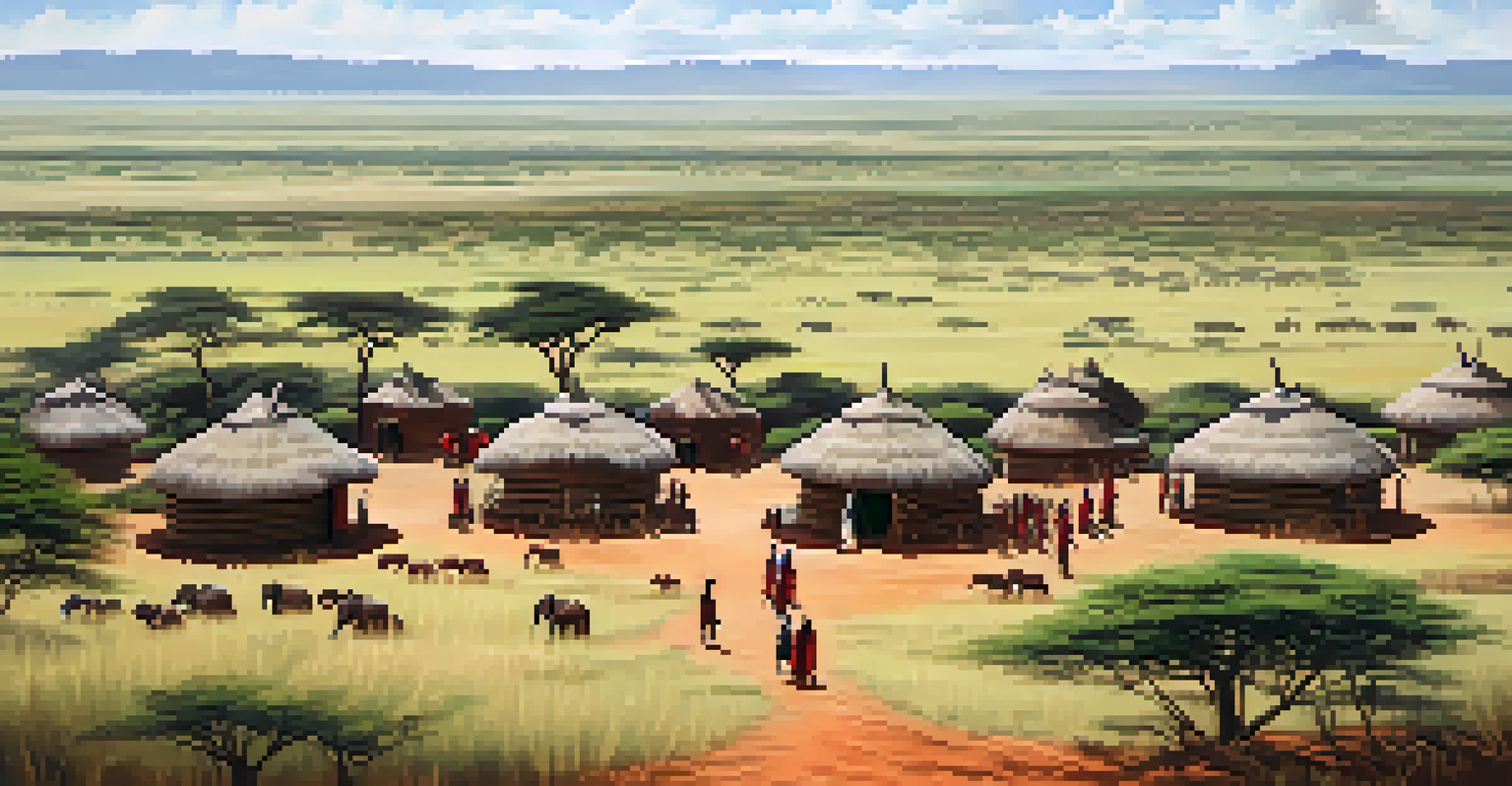The Impact of Ecotourism on Local Wildlife Conservation Efforts

Understanding Ecotourism: A Gentle Approach to Travel
Ecotourism is more than just a travel trend; it’s a philosophy that encourages responsible travel to natural areas. By focusing on conservation and sustainability, ecotourism allows visitors to appreciate wildlife without causing harm. Imagine walking through a lush rainforest, knowing your visit supports the local ecosystem rather than depleting it.
The greatest threat to our planet is the belief that someone else will save it.
This form of tourism often highlights unique ecosystems and their inhabitants, fostering a deeper appreciation for biodiversity. It’s like stepping into a living classroom, where every tree, animal, and sound plays a role in the larger story of nature. By promoting awareness, ecotourism inspires travelers to become advocates for conservation.
Moreover, by directly involving local communities, ecotourism creates economic incentives to protect wildlife. When locals see the benefits of preserving their environment, they are more likely to engage in conservation efforts, ensuring that both the land and its creatures thrive.
Economic Benefits of Ecotourism for Wildlife Conservation
One of the most significant impacts of ecotourism is its ability to provide financial support for conservation initiatives. When tourists visit an area, they often spend money on local guides, accommodations, and park fees, all of which can be funneled into conservation projects. This revenue stream can be a lifeline for endangered species and their habitats.

For example, in Costa Rica, ecotourism has become a powerful economic driver, helping to fund national parks that protect diverse wildlife. Imagine how different the landscape would be if these areas were converted to agriculture instead; the unique species that call these parks home would face dire threats.
Ecotourism Promotes Conservation
Ecotourism encourages responsible travel that supports wildlife conservation and local ecosystems.
Additionally, the financial benefits of ecotourism can empower local communities to take charge of their resources. With sustainable income from tourism, communities are less reliant on destructive practices like poaching or deforestation, fostering a healthier balance between human needs and wildlife conservation.
Ecotourism and Community Involvement in Conservation Efforts
A key component of successful ecotourism is the involvement of local communities. When locals participate in tourism, they gain a vested interest in protecting their environment. This partnership creates a win-win situation where both travelers and residents benefit.
Travel is fatal to prejudice, bigotry, and narrow-mindedness, and many of our people need it sorely on these accounts.
Consider the Maasai in Kenya, who have embraced ecotourism by offering cultural experiences alongside wildlife viewing. This not only showcases their rich heritage but also raises funds that support wildlife conservation in the region. It’s like turning the local culture into a living museum that also protects the land.
By empowering communities, ecotourism helps to cultivate a sense of stewardship for the natural world. As locals witness the positive effects of sustainable practices, they become champions of conservation, ensuring that future generations can enjoy the same wildlife-rich landscapes.
Challenges Faced by Ecotourism in Wildlife Conservation
While ecotourism has numerous benefits, it’s not without its challenges. For one, the influx of visitors can sometimes lead to habitat degradation if not managed properly. Think of it like a delicate balance; too many visitors can disturb the very ecosystems we aim to protect.
Additionally, there’s the risk of 'greenwashing,' where businesses market themselves as eco-friendly without genuine practices to back it up. This deceptive marketing can mislead travelers and undermine the very principles of ecotourism. It’s crucial for tourists to do their research and choose operators committed to real conservation efforts.
Local Communities Benefit Economically
Engaging local communities in ecotourism creates economic incentives to protect their environment.
Moreover, the economic dependency on tourism can create vulnerabilities, particularly during crises like pandemics. When travel restrictions hit, communities that rely on ecotourism can face financial hardship, which may lead to a rollback in conservation efforts. Thus, sustainable practices must be paired with resilience strategies to weather such storms.
Success Stories: Ecotourism Making a Difference
Around the world, there are inspiring examples of ecotourism leading to positive conservation outcomes. Take the Galápagos Islands, for instance, where strict limits on tourism have helped protect unique wildlife like giant tortoises and marine iguanas. The careful management of visitor numbers ensures that these species thrive while still allowing people to experience their beauty.
Another success story is found in Madagascar, where community-based ecotourism has resulted in the protection of critical habitats for lemurs and other endemic species. By involving locals in tourism, the program has not only boosted conservation efforts but also provided sustainable livelihoods for the communities.
These stories prove that when ecotourism is done right, it can create a ripple effect that benefits wildlife, local people, and travelers alike. They serve as beacons of hope, showing that our choices as travelers can lead to meaningful change.
The Role of Education in Ecotourism and Conservation
Education is at the heart of effective ecotourism and its impact on wildlife conservation. When travelers learn about the ecosystems they visit, they are more likely to appreciate the importance of protecting them. This knowledge can transform a casual visitor into a passionate advocate for conservation.
For instance, guided tours often include informative sessions about local flora and fauna, conservation challenges, and ongoing efforts to protect the environment. It’s like opening a window to a world of understanding that travelers might not have otherwise encountered.
Education Enhances Conservation Efforts
Educational initiatives in ecotourism empower travelers to become advocates for wildlife protection.
Furthermore, educational initiatives can extend beyond the trip itself, encouraging travelers to share what they’ve learned with others. When these individuals return home, they can inspire friends and family to value wildlife conservation, amplifying the impact of their experience.
The Future of Ecotourism and Wildlife Conservation
As the awareness of environmental issues grows, the future of ecotourism looks promising. More travelers are seeking sustainable options, pushing businesses to adopt practices that prioritize conservation. This shift in consumer behavior can drive significant change in the tourism industry.
Innovative technologies, such as virtual reality experiences, might also play a role in the future of ecotourism. By providing immersive experiences that don’t require physical travel, these tools can reduce the impact on wildlife while still educating and engaging audiences.

Ultimately, the journey of ecotourism and wildlife conservation is ongoing. By remaining committed to responsible travel practices, supporting local communities, and advocating for wildlife protection, we can all contribute to a healthier planet for generations to come.